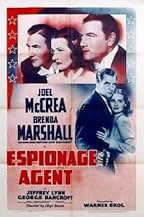Agrega una trama en tu idiomaAfter Barry Corvall discovers that his new bride is a possible enemy agent, he resigns from the diplomatic service to go undercover to root out an espionage ring planning to destroy American... Leer todoAfter Barry Corvall discovers that his new bride is a possible enemy agent, he resigns from the diplomatic service to go undercover to root out an espionage ring planning to destroy American industrial capability.After Barry Corvall discovers that his new bride is a possible enemy agent, he resigns from the diplomatic service to go undercover to root out an espionage ring planning to destroy American industrial capability.
- Dirección
- Guionistas
- Elenco
- Premios
- 1 premio ganado en total
- Paul Strawn
- (as Robert O. Davis)
- Dr. Helm
- (as Hans Von Twardowski)
- Instructor
- (as Emmet Vogan)
Opiniones destacadas
It's the second movie in 1939 that Warners made about the German threat. True, the country is never named, and the uniforms worn merely suggest it, but only Universal had made a stand earlier, and that went away with the Laemmles. This is quite obviously not a major production, and Warners was risking no major assets. They borrowed McCrea from Paramount, and this was Miss Marshall's first credited role. Director Lloyd Bacon obviously shot this on the cheap in his usual high-speed manner, but there's a strident call for tougher anti-espionage laws, and the Foreign Service is talked up as "America's first line of defense."
Cryptography buffs will snort when the new mechanical encryption system is talked up. It boasts over 2700 possible cyphers!
This takes place during the build up to WWII. America is still a few years away from joining. This movie is actually willing to name Germany as the enemy state although it couches the animosity from the first world war. There is a long presentation in the middle railing against possible sabotage from within and proposes more drastic measures to combat it. The first half is a little interesting. Once Barry is forced to quit, the story muddles around and loses its intensity. Sneaking around in a mansion is not going to add to the thrills. This movie is more interested in pushing the panic button on the home front. There are good reasons for that in the real world and it works in its propaganda purposes. For the cinematic world, it seems to be preaching.
Incidentally, the comment by "bkoganbing" is wrong. Though the film begins in 1915, it quickly leaps forward to 1936 (the year the Spanish Civil War broke out) and the bulk of it takes place in the late 1930's -- though, even so, the German uniforms are otherwise correct but their armbands are missing the swastika. Even after making "Confessions of a Nazi Spy" (which was about Nazi abuses in the U.S., not in their homeland), Warners was still being skittish about directly taking on the German government.
This is a very interesting film for several reasons. War is about to break out in Europe, and the U. S. is planning to stay neutral, and in fact, in one scene, an American broadcaster gives a call for neutrality.
After getting into the U. S. on a forged passport, McCrea's wife, played by the darkly beautiful Brenda Marshall, confesses her past associations, and states that she's been approached to do more favors for an espionage group. McCrea resigns his post, and with his wife's help, sets out to expose the spy network in the U. S.
In the aftermath of 9/11, watching a 67-year-old film where a group of people have agents in place throughout the country and sites ready to bomb is chilling.
There are some tense, exciting scenes and an attractive cast, but the film is more of historical interest than anything else. Look for TV Superman George Reeves in a very small, uncredited role.
¿Sabías que…?
- TriviaThe working title of this picture was "Career Man". It was released little over four months after another socially conscious Warner anti-Nazi film, Confesiones de un espía Nazi (1939). This was before America's involvement in WWII, when other studios were reluctant to antagonize the Germans. Reviews compared the film to Confesiones de un espía Nazi (1939) because of its exposé about espionage. The theme of Nazi Germany trying to disable the industrial capabilities of the U.S. would be taken up again in Alfred Hitchcock's "Saboteur" (1942), after America's entry into the war.
- ErroresGeorge Bancroft is credited onscreen as Dudley Garrett, but radio announcer Wendell Niles introduces him as Donald Garrett.
- Citas
State Department Official: Will we in this nation ever learn the difference between tolerance and stupidity?
- ConexionesReferenced in Shining Through (1992)
- Bandas sonorasI'll Sing You a Thousand Love Songs
(1936) (uncredited)
Music by Harry Warren
Dance music played after the marriage announcement
Selecciones populares
Detalles
- Fecha de lanzamiento
- País de origen
- Idioma
- También se conoce como
- Espionage Agent
- Locaciones de filmación
- Union Station - 50 Massachusetts Avenue NE, Washington, Columbia, Estados Unidos(establishing shot - exterior - archive footage)
- Productoras
- Ver más créditos de la compañía en IMDbPro
- Tiempo de ejecución
- 1h 23min(83 min)
- Color
- Mezcla de sonido
- Relación de aspecto
- 1.37 : 1


























